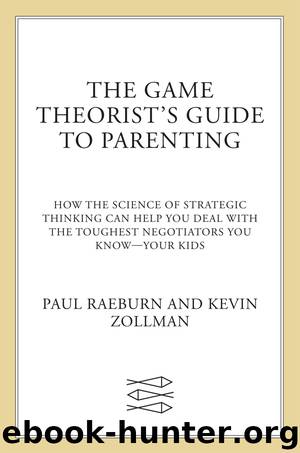The Game Theorist's Guide to Parenting by Paul Raeburn

Author:Paul Raeburn
Language: eng
Format: epub
ISBN: 9780374714406
Publisher: Farrar, Straus and Giroux
* * *
Our takeaways:
• The more often your children interact, the easier it will be for them to cooperate with one another.
• The benefits of repeated cooperative interaction works with friends as well as it does with siblings.
• Be sure to teach your kids how bad behavior today will affect how others treat them in the future.
• Teach your kids the game theorists’ version of Tit for Tat as a way to solve cooperative dilemmas.
* * *
7
Why Can’t You Pay for This?
Thomas, a smart kid who is in his elementary school’s gifted-and-talented program, is getting reasonably good grades, as he should. Not spectacular, but good enough—if we believe he is really doing his best.
But that’s the question: Is Thomas doing his best? Is he working hard and putting in the time required? Is he carefully thinking about the notes he jots down for his teacher on Diary of a Wimpy Kid? Or is he coasting—writing the first thing that comes to mind and doing just enough to get by? (“I thought this was a good book…”)
We want to encourage Thomas if he’s doing his best, and to give him credit for a job well done. We don’t want to lean on him to do better, because he’s already doing what he’s supposed to do. Pressuring him to get grades that aren’t achievable for him is going to make him miserable, make his parents miserable, and might even result in a note from the teacher asking why Thomas doesn’t seem to enjoy school anymore. On the other hand, if he’s truly slacking off, we want to let him know that that’s not a good strategy. We want to turn that around.
What do we do? The answer is that we need a reward system that will give Thomas incentives to work hard—without too much pressure. We want to give him a reason to do the best he can—without giving him the idea that nothing less than an A is acceptable.
Game theorists have developed what they call principal-agent models to try to solve problems such as these. In a nutshell, game theorists who’ve studied this try to create systems of incentives that can overcome the desire to avoid work while not punishing someone doing a good job. Let’s see how these models can work for you and your kids.
In most circumstances, parents are the principals in principal-agent models, and kids are the agents. To understand the relationship between principals and agents, think about the agents we see around us all the time. The “agents” in game theory are a lot like travel agents, literary agents, theatrical agents, the agents who represent high-powered athletes, to name a few. And real estate agents—an example many of us are familiar with. They are a good example of the kind of agents that game theorists think about.
Let’s say you want to move out of your tiny downtown apartment to a house in the suburbs. You might start your search by turning to the Web and scanning through the listings you find there.
Download
This site does not store any files on its server. We only index and link to content provided by other sites. Please contact the content providers to delete copyright contents if any and email us, we'll remove relevant links or contents immediately.
| Biomathematics | Differential Equations |
| Game Theory | Graph Theory |
| Linear Programming | Probability & Statistics |
| Statistics | Stochastic Modeling |
| Vector Analysis |
Modelling of Convective Heat and Mass Transfer in Rotating Flows by Igor V. Shevchuk(6440)
Weapons of Math Destruction by Cathy O'Neil(6281)
Factfulness: Ten Reasons We're Wrong About the World – and Why Things Are Better Than You Think by Hans Rosling(4742)
A Mind For Numbers: How to Excel at Math and Science (Even If You Flunked Algebra) by Barbara Oakley(3308)
Descartes' Error by Antonio Damasio(3279)
Factfulness_Ten Reasons We're Wrong About the World_and Why Things Are Better Than You Think by Hans Rosling(3239)
TCP IP by Todd Lammle(3185)
Fooled by Randomness: The Hidden Role of Chance in Life and in the Markets by Nassim Nicholas Taleb(3124)
The Tyranny of Metrics by Jerry Z. Muller(3073)
Applied Predictive Modeling by Max Kuhn & Kjell Johnson(3071)
The Book of Numbers by Peter Bentley(2968)
The Great Unknown by Marcus du Sautoy(2695)
Once Upon an Algorithm by Martin Erwig(2650)
Easy Algebra Step-by-Step by Sandra Luna McCune(2636)
Lady Luck by Kristen Ashley(2583)
Police Exams Prep 2018-2019 by Kaplan Test Prep(2549)
Practical Guide To Principal Component Methods in R (Multivariate Analysis Book 2) by Alboukadel Kassambara(2545)
All Things Reconsidered by Bill Thompson III(2394)
Linear Time-Invariant Systems, Behaviors and Modules by Ulrich Oberst & Martin Scheicher & Ingrid Scheicher(2371)
